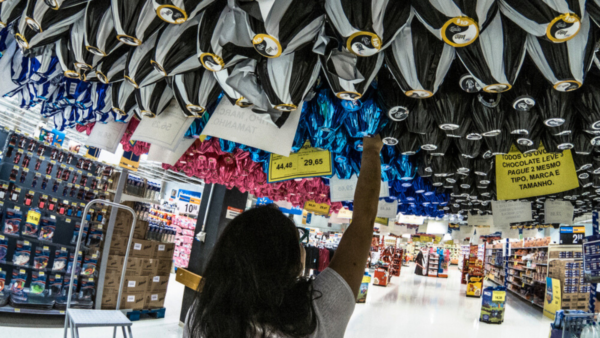Inflation under control and falling interest rates are likely to contribute to a slight increase in digital investments by Brazilian companies this year.
According to a quarterly survey of about 4,000 companies conducted by the Brazilian Agency for Industrial Development (ABDI) and the Brazilian Institute of Economics at the Fundação Getulio Vargas (FGV-Ibre) think tank, this type of investment fell by 3.5 points to 116.4 points in the second quarter, signaling a slowdown from the first quarter’s pace of 131.2 points.
The ABDI index ranges from 0 to 200 points: 100 is neutral, while lower values imply a slowdown, and higher ones signal an acceleration in investment.
The slower pace of investment, especially in the second half of last year, followed the slowdown in the Brazilian economy and was mainly driven by micro and small businesses, which were the most affected by higher debt and delinquency levels.
While micro and small businesses saw their investment fall by 2.1 points, medium-size enterprises saw an increase in investment of 0.7 points over the past year.
Investment expectations for the next 12 months also fell by 5.4 points to 115.7 points between 2022 and 2023, with trade and services firms more pessimistic than industry and construction.
Still, most companies (48.5 percent) say they intend to at least maintain their investment levels this year. However, increased investment does not always translate into actual digital transformation.
According to Raphael Ribeiro, productivity and innovation analyst at ABDI, significant challenges remain.
A number of factors can justify the drop in investment by micro and small companies: limited financial resources, teams without technical qualifications to carry out the digitalization process, insufficient technological infrastructure, resistance to change, in addition to an overload of work that makes it difficult to implement good digital practices.
“These factors, taken together, reinforce the need for well-designed policies and strategies to drive the digital transformation of small businesses in a sustainable and comprehensive way,” he tells The Brazilian Report.
In terms of the types of investments that Brazilian companies are planning, the ABDI survey indicates that their main focus will be on finding new ways to use data in decision-making processes. More than half of the companies surveyed say they already do this on a daily basis, but the share of those who intend to invest more in this area rose from 33.9 percent in December 2022 to 40.9 percent last year.
On the other hand, fewer companies (see below) are interested in implementing new digital systems, such as ERP, CRM, and data analytics platforms, or increasing their digital presence than last year, probably because they have already invested heavily in these two areas.
It is difficult to know exactly what level of digital transformation Brazilian companies of all sectors are at, but other studies and data suggest that they still need to make significant progress.
An index created by consulting firm PwC and Fundação Dom Cabral, based on about 100 large and medium-sized Brazilian companies, found that they are at a medium level of digital transformation, with a maturity index of 3.3 on a scale of one to six. The lack of a digital culture and experience with digital projects are among the main challenges for Brazilian companies to achieve a higher score.
Among those with a higher score, the most significant transformation was related to automation and digital processes: 93 percent of the companies surveyed made changes in this area in the last five years.
The most challenging area, however, is cybersecurity, with only 3 percent claiming to have implemented robust measures such as predictive fraud analysis and personal data protection. This is worrying, given that Brazil is consistently among the world’s top targets for cyberattacks.
In the industrial sector, which should be the most advanced, only 23.5 percent of companies are considered digitized by the Industry and Foreign Trade Ministry. Increasing this percentage is critical to improving the country’s overall digital competitiveness.
Last year, Brazil returned to 57th place in the International Institute for Management Development’s (IMD) World Digital Competitiveness Ranking (WDC), the same position as in 2018 and 2019, due in part to the lack of technological skills among its workforce.
In its new industrial policy, launched at the end of January, the government set a specific target to address this issue, committing to increase this share to 90 percent by 2033. To this end, more than BRL 2 billion (USD 400 million) will be allocated over the next two years through government agencies and sector associations to serve 200,000 companies in various ways.
While courses and digital tools will be offered to most companies, more specialized approaches will be more limited in scope — consulting services to implement industrial optimization, such as more energy-efficient production lines, will target 33,000 small and medium-sized industries, while assistance to implement 4.0 technologies could reach 360 companies by 2026.










 Search
Search






































